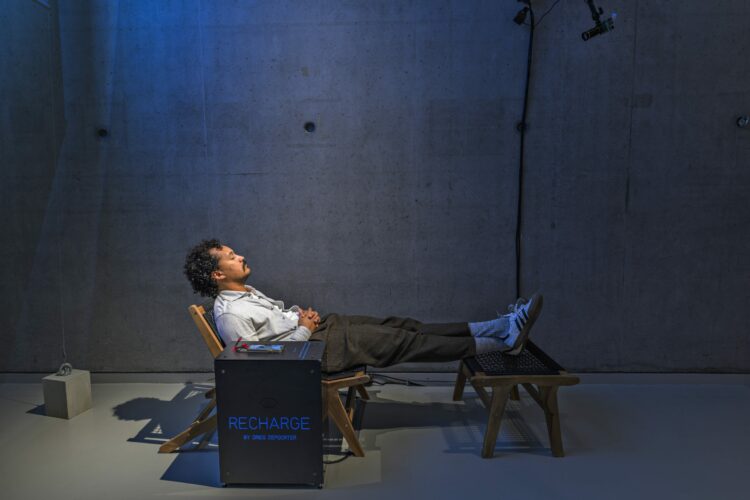If you want to feel like you’re getting old, visit an optometrist and have them tell you that in 6 to 12 months you won’t be able to read things up close and you’ll need bifocals. Here’s when your senses will decline.
Category Archives: Vision
Posted by in age, Data Underload, hearing, Vision
A phone charger that only works when you recharge yourself
Recharge, an art installation by Dries Depoorter, uses a system that detects when you close your eyes. Recharge yourself and your phone gets to also.
Tags: Dries Depoorter, phones, vision
Posted by in Data Art, Dries Depoorter, phones, Vision
Robot arm seeks out Waldo, using machine learning
The camera on the slightly creepy arm takes a picture of the pages in the book, the software uses OpenCV to extract faces, and the faces are passed to Google Auto ML Vision comparing the faces to a Waldo model. The result: There’s Waldo.
Tags: machine learning, robot, vision, Waldo
Posted by in machine learning, robot, statistics, Vision, Waldo
Visual connections between art pieces
This is neat. A Google Arts & Culture Experiment, X Degrees of Separation shows a path of visual connections between two art pieces of your choosing. It’s like Six Degrees of Kevin Bacon but with art, computer vision, and machine learning.
Tags: art, Google, machine learning, vision
Sentiment analysis on Trump and Clinton faces during debate
For anyone who watched the presidential debates, I think it was fairly obvious what emotion each candidate projected at various moments. However, a group of graduate students from Columbia University applied computer vision and sentiment analysis to get a more quantitative gauge. Because, sure, why not. Sarah Slobin for Quartz explains the results.
Posted by in election, sentiment, statistics, Vision
Seeing like a computer: What neuroscience can learn from computer science
By Marta Kryven What do computers and brains have in common? Computers are made to solve the same problems that brains solve. Computers, however, rely on a drastically different hardware, which makes them good at different kinds of problem solving. … Continue reading
The post Seeing like a computer: What neuroscience can learn from computer science appeared first on PLOS Blogs Network.
Posted by in biometric processing, computer science, computer vision, neuroscience, The Student Blog, Vision
Imperfect science of #TheDress, RIP Leonard Nimoy and Mr. Spock
Devil in a blue dress See, this is part of the reason why people don’t trust science. People crave complete explanations for the phenomena of life. Science is frustrating because mostly it can generate only partial explanations for now and … Continue reading
The post Imperfect science of #TheDress, RIP Leonard Nimoy and Mr. Spock appeared first on PLOS Blogs Network.
Posted by in #TheDress, brain, color, Leonard Nimoy, Mr. Spock, optical illusion, Perception, twitter, Vision
What’s in a Look? For Wolves, Maybe Everything
 It’s been said that the eyes are the windows to the soul. They allow us to communicate feelings across a room, direct the attention of others, and express emotion better than words ever could. The importance of eye contact …
It’s been said that the eyes are the windows to the soul. They allow us to communicate feelings across a room, direct the attention of others, and express emotion better than words ever could. The importance of eye contact …
The post What’s in a Look? For Wolves, Maybe Everything appeared first on PLOS Blogs Network.
Posted by in Aggregators, animal behavior, camouflage, communication, eye contact, eyes, hunting, Images, Vision, wolves



